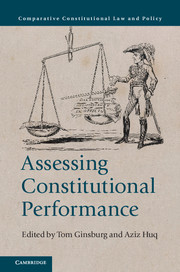Book contents
- Frontmatter
- Contents
- List of figures
- List of tables
- List of contributors
- Acknowledgments
- INTRODUCTION
- PART I DEFINING CONSTITUTIONAL PERFORMANCE
- PART II MANAGING SPECIFIC CONSTITUTIONAL CHALLENGES
- PART III CASE STUDIES
- 11 Ambedkar's constitution: Promoting inclusion, opposing majority tyranny
- 12 Assessing the Constitution of Kenya 2010 five years later
- 13 The Arab Spring constitutions: For whose benefit?
- 14 Stability in flexibility: A British lens on constitutional success
- Index
- References
11 - Ambedkar's constitution: Promoting inclusion, opposing majority tyranny
from PART III - CASE STUDIES
Published online by Cambridge University Press: 05 August 2016
- Frontmatter
- Contents
- List of figures
- List of tables
- List of contributors
- Acknowledgments
- INTRODUCTION
- PART I DEFINING CONSTITUTIONAL PERFORMANCE
- PART II MANAGING SPECIFIC CONSTITUTIONAL CHALLENGES
- PART III CASE STUDIES
- 11 Ambedkar's constitution: Promoting inclusion, opposing majority tyranny
- 12 Assessing the Constitution of Kenya 2010 five years later
- 13 The Arab Spring constitutions: For whose benefit?
- 14 Stability in flexibility: A British lens on constitutional success
- Index
- References
Summary
So rigorous is the enforcement of the Social Code against the Depressed Classes that any attempt on the part of the Depressed Classes to exercise their elementary rights of citizenship only ends in provoking the majority, to practice the worst form of social tyranny known to history. It will be admitted that when society is itself a tyrant, its means of tyrannizing are not restricted to the acts which it may do by the hands of its functionaries and it leaves fewer means of escape penetrating much more deeply into the details of life, and enslaving the soul itself.
B. R. Ambedkar, 1928Our society often ridicules and abuses the Transgender community and in public places like railway stations, bus stands, schools, workplaces, malls, theatres, hospitals, they are sidelined and treated as untouchables, forgetting the fact that the moral failure lies in the society's unwillingness to contain or embrace different gender identities and expressions, a mindset which we have to change.
Supreme Court of India, National Legal Services Foundation v. Union of India, 2014CURBING MAJORITY TYRANNY, PROMOTING SOCIAL INCLUSION
India's Constitution, like others the world over, was ratified by a constitutional assembly. Unlike many or even most, however, it is to a considerable extent the creation of one dominant legal intellect, B. R. Ambedkar (1891–1956), who, as Nehru's law minister, had considerable latitude in drafting it and who has told history a great deal about what he wanted to achieve and at times had to fight to achieve. He argued extensively for a particular conception of the Constitution, one in which a central purpose was protecting vulnerable minorities from majority tyranny and promoting their full social inclusion. He focused centrally on the evils of the Hindu caste hierarchy, but he was also passionately concerned with the situation of India's women and its religious minorities. Although he did not address the problems faced by sexual minorities and transgender people, his name and his principles have been central to recent legal activism in these areas. In a very general way, Ambedkar saw the practice of stigmatizing and excluding groups of people as a major obstacle to India's success as a nation, and one that law could productively address.
- Type
- Chapter
- Information
- Assessing Constitutional Performance , pp. 295 - 336Publisher: Cambridge University PressPrint publication year: 2016
References
- 1
- Cited by



